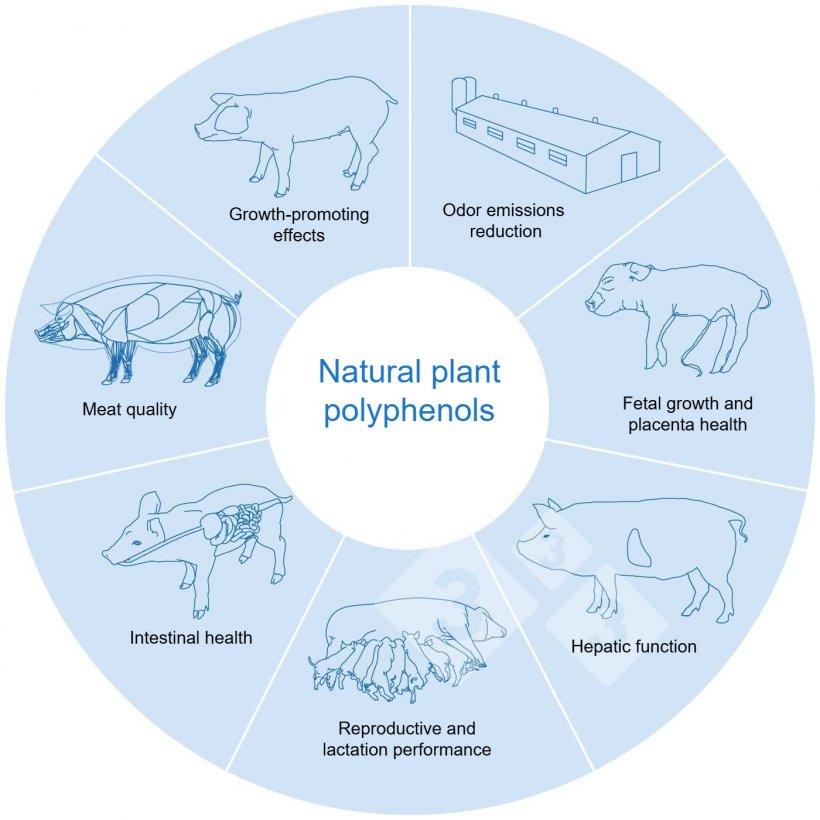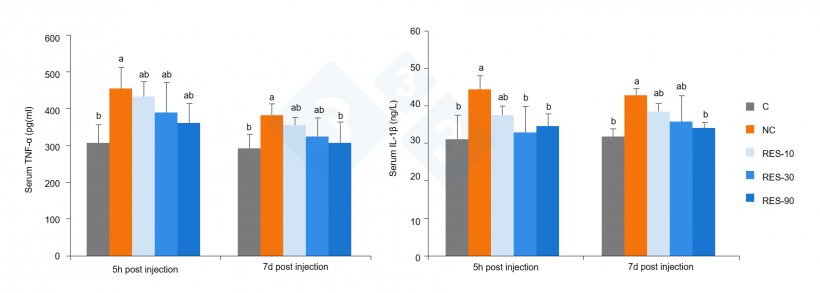In this context, plant-derived active compounds (PACs) and tributyrins have shown significant potential to modulate the inflammatory response and improve the intestinal health of pigs.
Phytochemicals: Resveratrol and Quercetin as inflammation modulators
Plants are a rich source of bioactive compounds that can positively influence animal health. Among these, flavonoids, polyphenols, and terpenoids are known for their anti-inflammatory properties. These compounds can reduce the production of pro-inflammatory cytokines and enhance the immune response (Lorente-Cebrián et al., 2025; Cox-Georgian et al., 2019). For example, oregano (Origanum vulgare) and thyme (Thymus vulgaris) extracts have proven effective in reducing inflammatory markers in pig studies (Zeng, Z., et al., 2015). Their inclusion in the diet not only improves intestinal health but can also lead to greater feed efficiency and optimal growth. Additionally, these extracts have been observed to help combat pathogens, thereby reducing the need for antibiotics in animal production.


Among these secondary metabolites produced by plants in response to environmental stress, resveratrol and quercetin stand out for their anti-inflammatory and antioxidant properties.
Resveratrol, a polyphenol found in the skin of grapes, blueberries, and other berries, has demonstrated its ability to inhibit the nuclear factor kappa B (NF-κB) pathway, a key regulator of chronic inflammation (Sabzevary-Ghahfarokhi et al., 2020).
In a study with pigs, Xun et al. (2020) evaluated the effect of resveratrol in piglets challenged with Diquat, a pro-oxidant agent. The challenge was applied by a single intraperitoneal injection of 10 mg/kg body weight on day 15 of the experiment. The inclusion of 90 mg/kg of resveratrol (RES-90) in the diet successfully restored feed conversion ratio (FCR) to control levels and reduced serum levels of IL-1 and TNF-α.

Quercetin, a flavonol found in onions, apples, and capers, has also shown notable anti-inflammatory effects. In a study involving finishing pigs subjected to transport stress (Zou et al., 2016), supplementation with 25 mg/kg of quercetin significantly reduced the expression of pro-inflammatory genes such as IL-1β, IL-6, TNF-α, and MCP-1 in the jejunum. Additionally, it lowered the levels of reactive oxygen species (ROS) and malondialdehyde, both indicators of intestinal oxidative stress.
- Objective: To evaluate whether quercetin protects the intestine of pigs during transport.
- Experimental design: 170 pigs divided into 2 groups: control (basal diet) and treatment (diet+quercetin 25mg/kg) during 4 weeks.
- The animals were transported for 5 hours in an open truck, at 20-30ºC
- Samples were collected and blood and intestine analyses were performed: endotoxins, ROS, MDA, binding proteins and cytokines.
Table 1. Effect of quercetin on mRNA levels of pro-inflammatory cytokines in the jejunum of pigs subjected to transport stress. MCP-1 – Monocyte Chemoattractant Protein 1 (Zou et al, 2016),
| Gene | Control | Quercetin | SEM | P value |
|---|---|---|---|---|
| IL-1β | 1.00 | 0.29** | 0.11 | <0.01 |
| IL-6 | 1.00 | 0.12** | 0.18 | <0.01 |
| TNFα | 1.00 | 0.29** | 0.13 | <0.01 |
| MCP-1 | 1.00 | 0.28** | 0.13 | <0.01 |
**Significantly different (P<0.01) from the control group
Tributyrins: Energetic and intestinal anti-inflammatory support
Tributyrins are glycerol esters that release butyric acid in the small intestine. This short-chain fatty acid is an essential energy source for enterocytes and acts as an epigenetic modulator, inhibiting the activation of NF-κB and promoting the integrity of the intestinal barrier (Wang et al., 2019).
Studies have shown that tributyrin supplementation improves intestinal morphology, reduces permeability, and strengthens the local immune response.
In stressful situations, such as weaning or dietary changes, its inclusion in the feed can prevent dysbiosis and reduce the incidence of post-weaning diarrhea (Wang et al., 2019).
Synergy between PACs and tributyrins: A comprehensive strategy
The combination of PACs and tributyrins offers a synergistic approach to controlling intestinal inflammation. While PACs act on specific molecular pathways (such as NF-κB) and neutralize free radicals, tributyrins strengthen intestinal structure and modulate the microbiota.
A recent study showed that combining tributyrin with oregano may be a promising alternative to antibiotics, as it improves intestinal structure and positively modulates the microbiota and intestinal metabolites, thereby contributing to the gut health of weaned piglets (Zang et al., 2020). This strategy not only enhances animal welfare but also contributes to more efficient and sustainable production.

Practical considerations and ingredient quality
It is important to note that the concentration of PACs in plant-based ingredients can vary considerably, as their synthesis depends on environmental factors. Therefore, it is essential to use standardized products with analytical traceability to ensure the presence of the desired active compounds.
Additionally, formulation should take into account the bioavailability of these compounds, as some—such as resveratrol—exhibit low intestinal absorption.
Conclusion
Chronic inflammation in pigs can be effectively addressed through nutritional strategies based on natural compounds. The combined use of PACs such as resveratrol and quercetin, along with tributyrins, represents a promising alternative to improve intestinal health, reduce antibiotic use, and optimize productive performance. Implementing these solutions requires a rigorous technical approach, with special attention to ingredient quality and standardization.
Investing in natural nutritional strategies not only improves animal health but also strengthens the sustainability of the production system.



